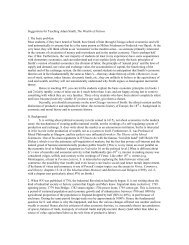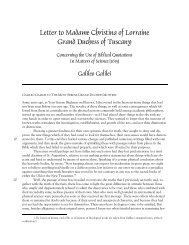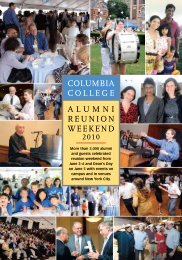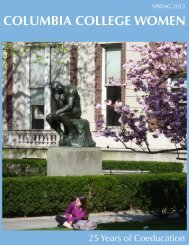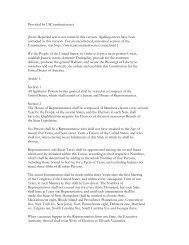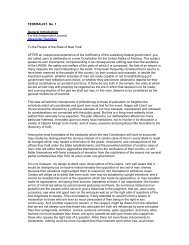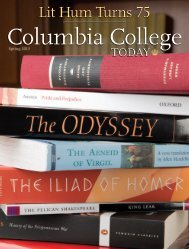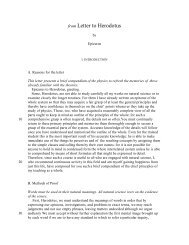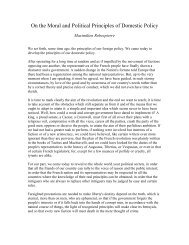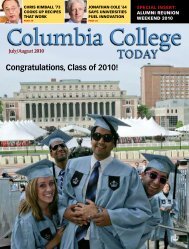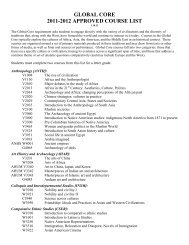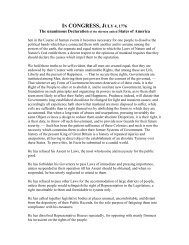Download this issue as a PDF - Columbia College - Columbia ...
Download this issue as a PDF - Columbia College - Columbia ...
Download this issue as a PDF - Columbia College - Columbia ...
Create successful ePaper yourself
Turn your PDF publications into a flip-book with our unique Google optimized e-Paper software.
AROUND THE QUADS COLUMBIA COLLEGE TODAY COLUMBIA COLLEGE TODAY AROUND THE QUADS<br />
Robert Y. Shapiro, who specializes<br />
in American politics,<br />
is a professor and former<br />
chair of the Department of<br />
Political Science. His most<br />
recent books include The<br />
Oxford Handbook of American<br />
Public Opinion and the<br />
Media (edited with Lawrence<br />
R. Jacobs) and Selling<br />
Fear:Counterterrorism,<br />
the Media, and Public<br />
Opinion (with <strong>Columbia</strong>’s<br />
Brigitte L. Nacos and<br />
Yaeli Bloch-Elkon). Shapiro<br />
earned a B.S. from MIT and<br />
a Ph.D. from Chicago; he h<strong>as</strong><br />
worked at <strong>Columbia</strong> since<br />
1982 and l<strong>as</strong>t sat for “5 Minutes<br />
with” in summer 2008.<br />
You recently returned from<br />
Egypt. Tell me about that.<br />
I w<strong>as</strong> invited to speak at<br />
the American University in<br />
Cairo by the president of the<br />
univer sity, Lisa Anderson,<br />
who is a former dean of<br />
SIPA. She in vited three of<br />
her successor department<br />
chairs, including myself, to<br />
run a 3 ½-day workshop on<br />
research methods in political<br />
science for the purposes of,<br />
<strong>as</strong> I like to say, jumpstarting<br />
interest in quantitative approaches<br />
to political science<br />
and studying political <strong>issue</strong>s<br />
relevant to the students and<br />
faculty.<br />
How did it go?<br />
It went well; we got people’s<br />
attention. We talked about<br />
big-picture <strong>issue</strong>s that were<br />
quite relevant to what’s<br />
been happening in Egypt —<br />
things like the relationship<br />
between democracy and<br />
economic development, the<br />
relationship between Islam<br />
and democratization, the<br />
relationship between Islam<br />
and oil, and the empowerment<br />
of women in the Middle<br />
E<strong>as</strong>t and elsewhere and<br />
then, also, the relationship<br />
between democratization<br />
and political conflict, civil<br />
wars and things like that.<br />
Will you be involved with<br />
the U.S. presidential election<br />
<strong>this</strong> fall?<br />
As of now, I don’t have any<br />
plans to be. The l<strong>as</strong>t election<br />
I w<strong>as</strong> involved in w<strong>as</strong> doing<br />
exit poll analysis for ABC<br />
News, in 2008. But I do follow<br />
the data regularly and more<br />
so <strong>as</strong> the election nears.<br />
And what are you seeing?<br />
One, polls show that the upcoming<br />
election is going to be<br />
a close election — you don’t<br />
have to be a political science<br />
expert or professor to get a<br />
sense of that. But to put it in<br />
historical context, the competitiveness<br />
of politics is very<br />
different now from the latter<br />
part of the 20th century, when<br />
both parties were competitive<br />
for control of the White House<br />
but the Democrats, for a big<br />
chunk of the post-war period,<br />
controlled the Senate and the<br />
House of Representatives. That<br />
changed beginning in 1980<br />
when the Republicans won<br />
the Senate on Ronald Reagan’s<br />
coattails and then continued<br />
in 1994, which w<strong>as</strong> a very important<br />
election — the Republicans<br />
were finally able to get<br />
control of the House of Representatives,<br />
which they hadn’t<br />
done in 40 some-odd years.<br />
The other pattern is the<br />
overall nature of partisan<br />
conflict in the United States.<br />
The parties are divided at the<br />
level of political leadership<br />
and you find the same thing<br />
at an unprecedented level in<br />
m<strong>as</strong>s public opinion, where<br />
Democrats and Republicans<br />
more consistently think of<br />
themselves and call themselves<br />
liberals and conservatives<br />
and take identifiable,<br />
predictable patterns of liberal<br />
and conservative opinions<br />
on policy <strong>issue</strong>s in a way that<br />
they hadn’t in the middle of<br />
the 20th century.<br />
FALL 2012<br />
10<br />
What are you focusing on<br />
these days with regard to<br />
your own research?<br />
I recently worked with some<br />
undergraduates, looking at<br />
American public opinion<br />
trends toward the Mide<strong>as</strong>t<br />
conflict, focusing on the Israelis<br />
and the Palestinians. And<br />
then I’m also working on a<br />
Five Minutes with ... Robert Y. Shapiro<br />
higher-priority book project<br />
with my recent collaborators,<br />
Nacos and Bloch-Elkon, looking<br />
at the Tea Party movement<br />
and the Occupy Wall<br />
Street movement — how they<br />
were covered by the media<br />
and how they, in turn, used<br />
the m<strong>as</strong>s media and social<br />
media in their efforts. And<br />
what broader effects <strong>this</strong> h<strong>as</strong><br />
had on American politics.<br />
Would you anticipate that<br />
the Tea Party and Occupy<br />
Wall Street will continue<br />
to have <strong>as</strong> much influence<br />
moving forward?<br />
What movements are successful<br />
at, if not persuading people<br />
to adopt the opinions they<br />
adopt, is to make <strong>issue</strong>s visible<br />
and more salient. With the<br />
Tea Party, things had settled<br />
down for a while — the party<br />
seemed to have lost some of<br />
its luster — but things are<br />
now heating up in the current<br />
election, and the Republican<br />
party is a stronger<br />
conservative party because<br />
of the Tea Party movement.<br />
As for the effect of Occupy,<br />
the big question is, had they<br />
not become active in the way<br />
they were, would the<br />
Democrats and<br />
Obama have<br />
used the <strong>issue</strong><br />
of economic<br />
inequality<br />
the way<br />
they are in<br />
the current<br />
campaign?<br />
We can’t run the experiment,<br />
but I suspect they may have<br />
not.<br />
What does your middle initial<br />
Y stand for?<br />
Yale. H<strong>as</strong> nothing to do with<br />
the university. It’s an Anglicized<br />
and greatly shortened<br />
Yiddish name.<br />
Is there anything else<br />
you think we should<br />
talk about?<br />
I still like pizza. [laughs]<br />
That’s right. You mentioned<br />
that the l<strong>as</strong>t time you sat<br />
with CCT.<br />
The funny part w<strong>as</strong>, when my<br />
wife read the interview, she<br />
said she learned some things<br />
about me that she didn’t<br />
know. She didn’t really fully<br />
appreciate how much my favorite<br />
food is pizza.<br />
Did she know about your<br />
dream of being shortstop for<br />
the Yankees?<br />
No, but anybody who knew<br />
me when I w<strong>as</strong> young would<br />
understand that.<br />
Interview: Alexis Tonti ’11 Arts<br />
Photo: Eileen Barroso<br />
For more conversation with<br />
Shapiro, go to Web Extr<strong>as</strong> at<br />
college.columbia.edu/cct.<br />
Virginia W. Cornish ’91 Named Helena Rubinstein Professor<br />
Virginia W. Cornish ’91, the first<br />
<strong>College</strong> alumna to become a<br />
tenured professor at the University,<br />
h<strong>as</strong> been named the Helena<br />
Rubinstein Professor of Chemistry.<br />
The Helena Rubinstein Foundation created<br />
a $2 million endowed professorship in<br />
support of the advancement of women in<br />
science at <strong>Columbia</strong>, and Cornish w<strong>as</strong> announced<br />
<strong>as</strong> the inaugural appointee of <strong>this</strong><br />
chair on June 5 at the Northwest Corner<br />
Building, the site of her laboratory. Working<br />
at the interface of chemistry and biology,<br />
Cornish’s lab brings together organic chemistry<br />
and DNA technology to expand the<br />
synthetic capabilities of living cells.<br />
Trustees Chair Emerita G.G. Michelson<br />
’47L, longtime chair of the Helena Rubinstein<br />
Foundation, and Diane Moss, president<br />
of the foundation, were instrumental<br />
in working with <strong>Columbia</strong> to identify an<br />
appropriate and enduring recognition of<br />
Rubinstein’s legacy. Rubinstein often said<br />
that her “fortune comes from women and<br />
should be used to benefit them and their<br />
children, to better their quality of life”<br />
and “to encourage women to undertake<br />
higher education and to pursue nontraditional<br />
careers.”<br />
Cl<strong>as</strong>ses<br />
1943<br />
1948<br />
1953<br />
1958<br />
1963<br />
1968<br />
1973<br />
1978<br />
1983<br />
1988<br />
1993<br />
1998<br />
2003<br />
2008<br />
C O L U M B I A C O L L E G E<br />
ALUMNI REUNION WEEKEND<br />
Make plans now to return to New<br />
York City and the <strong>Columbia</strong> campus<br />
for Alumni Reunion Weekend 2013.<br />
The weekend will feature:<br />
Cl<strong>as</strong>s-specific activities, cocktail receptions and dinners<br />
planned by each cl<strong>as</strong>s’s Reunion Committee;<br />
“Back on Campus” sessions featuring Mini-Core Courses,<br />
Public Intellectual Lectures and more <strong>as</strong> part of Dean’s<br />
Day on Saturday;<br />
New York City entertainment options including an art<br />
gallery crawl, Broadway shows and other cultural activities;<br />
All-cl<strong>as</strong>s programs including the Wine T<strong>as</strong>ting and the<br />
Starlight Reception, with dancing, champagne and sweets<br />
on Low Plaza; and<br />
Camp <strong>Columbia</strong> for Kids, ages 3–12.<br />
Virginia W. Cornish ’91 is joined at the announcement by her colleague and mentor, University<br />
Professor Ronald Breslow (left), and Joseph Dougherty ’95 GSAS, who also worked<br />
in Breslow’s lab.<br />
PHOTO: SUSAN COOK<br />
In an effort to reduce costs and be environmentally friendly,<br />
<strong>Columbia</strong> <strong>College</strong> Alumni Affairs and your cl<strong>as</strong>s’s Reunion<br />
Committee will communicate with you via email <strong>as</strong> much<br />
<strong>as</strong> possible. Be sure you don’t miss out on reunion details!<br />
Update your contact information at reunion.college.<br />
columbia.edu/alumniupdate.<br />
Watch your mail and email for details.<br />
Questions? Ple<strong>as</strong>e contact<br />
Fatima Yudeh, alumni affairs:<br />
fy2165@columbia.edu<br />
or 212-851-7834.<br />
COLLEGE<br />
COLLEGE<br />
COLUMBIA ALUMNI REUNION<br />
WEEKEND<br />
SAVE THE DATE THURSDAY, MAY 30–- SUNDAY, JUNE 2, 2013



